
San Francisco Municipal Railway fleet
Encyclopedia
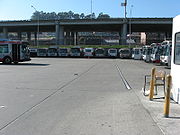
San Francisco Municipal Railway
The San Francisco Municipal Railway is the public transit system for the city and county of San Francisco, California. In 2006, it served with an operating budget of about $700 million...
, or Muni as it is commonly known, runs one of the most diverse fleets of vehicles in the United States
United States
The United States of America is a federal constitutional republic comprising fifty states and a federal district...
. Roughly 1,000 buses, 200 streetcars, and 40 cable cars see active duty. Muni's forty cable cars represent one of the oldest, last remaining public transportation fleets of cable cars
Cable car (railway)
A cable car or cable railway is a mass transit system using rail cars that are hauled by a continuously moving cable running at a constant speed. Individual cars stop and start by releasing and gripping this cable as required...
remaining in service around the world. Muni's fleet of diesel-electric hybrid buses is the third largest in the nation, and there are plans in place to replace the existing diesel fleet with hybrid buses. Continuing the trend, Muni's fleet of electric trolleybuses is one of the oldest and largest remaining in the United States. A summary of the current and historic vehicles follows below.
Current fleet
| Length/Fuel | Model | Year Built | Quantity | Floor Styling | Fleet Series | Wheelchair access | Image |
|---|---|---|---|---|---|---|---|
| 40 ft./Diesel Bus | NABI North American Bus Industries North American Bus Industries, commonly known as NABI, is a major transit bus manufacturing company based in Anniston, Alabama. NABI was founded in 1992 when the Hungarian firm Ikarus Bus, a key bus supplier to Central, Eastern Europe, spun off a majority share of their American operations to... 416 |
1999 | 45 | High | 8001-8045 |  |
|
| Neoplan Neoplan USA Neoplan USA was a major transit bus manufacturing company based in Denver, Colorado, which was entirely separate from the German corporation, Neoplan, licensing its designs from the German company of the same name. The company was founded in 1981 and folded in 2006. It was originally a subsidiary... AN440 Neoplan AN440 The Neoplan Transliner was a series of related mass transit bus models introduced by Neoplan USA in 1981.- Models :The Transliner was available in a wide variety of body styles. Transliners could be ordered in 35', 40', and 60' lengths... |
2000-2003 | 206 | High | 8101-8230; 8301-8376 |  |
||
| 40 ft./Diesel-electric Hybrid Diesel-electric Diesel-electric transmission or diesel-electric powertrain is used by a number of vehicle and ship types for providing locomotion.A diesel-electric transmission system includes a diesel engine connected to an electrical generator, creating electricity that powers electric traction motors... Bus |
Orion Bus Orion Bus Industries Orion International, previously Orion Bus Industries and Ontario Bus Industries in Canada and Bus Industries of America in the United States, is a bus manufacturer based in Mississauga, Ontario, Canada and established by the Government of Ontario in 1975... VII |
2007 | 56 | Semi-low | 8401-8456 |  |
|
| 30 ft./Diesel-electric Hybrid Diesel-electric Diesel-electric transmission or diesel-electric powertrain is used by a number of vehicle and ship types for providing locomotion.A diesel-electric transmission system includes a diesel engine connected to an electrical generator, creating electricity that powers electric traction motors... Bus |
Orion Bus Orion Bus Industries Orion International, previously Orion Bus Industries and Ontario Bus Industries in Canada and Bus Industries of America in the United States, is a bus manufacturer based in Mississauga, Ontario, Canada and established by the Government of Ontario in 1975... VII |
2007 | 30 | Semi-low | 8501-8530 | ||
| 60 ft./Articulated Articulated bus An articulated bus is an articulated vehicle used in public transportation. It is usually a single-deck design, and comprises two rigid sections linked by a pivoting joint... Diesel Bus |
Neoplan Neoplan USA Neoplan USA was a major transit bus manufacturing company based in Denver, Colorado, which was entirely separate from the German corporation, Neoplan, licensing its designs from the German company of the same name. The company was founded in 1981 and folded in 2006. It was originally a subsidiary... AN460 Neoplan AN440 The Neoplan Transliner was a series of related mass transit bus models introduced by Neoplan USA in 1981.- Models :The Transliner was available in a wide variety of body styles. Transliners could be ordered in 35', 40', and 60' lengths... |
2002-2003 | 124 | High | 6200-6299; 6401-6424 |  |
|
| 60 ft./Articulated Articulated bus An articulated bus is an articulated vehicle used in public transportation. It is usually a single-deck design, and comprises two rigid sections linked by a pivoting joint... Diesel Bus |
New Flyer D60 | 1991 | 5 | High | 9106; 9117; 9120-9122 |  |
|
| 40 ft./Trolleybus Trolleybus A trolleybus is an electric bus that draws its electricity from overhead wires using spring-loaded trolley poles. Two wires and poles are required to complete the electrical circuit... |
ETI Electric Transit, Inc. Electric Transit, Inc. was a joint venture between the Škoda group in the Czech Republic and AAI Corporation in the United States which made trolleybuses for the Dayton and San Francisco trolleybus systems, constructing a total of 330 trolleybuses. ETI was formed in 1994, and ownership was divided... 14TrSF |
2001-2003 (first two were built in 1999) |
240 | High | 5401-5640 | 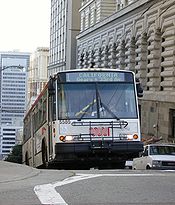 |
|
| 60 ft./Articulated Articulated bus An articulated bus is an articulated vehicle used in public transportation. It is usually a single-deck design, and comprises two rigid sections linked by a pivoting joint... Trolleybus Trolleybus A trolleybus is an electric bus that draws its electricity from overhead wires using spring-loaded trolley poles. Two wires and poles are required to complete the electrical circuit... |
New Flyer E60 | 1992-1994 | 40 | High | 7000-7059 (skipping 20 numbers) |  |
|
| ETI Electric Transit, Inc. Electric Transit, Inc. was a joint venture between the Škoda group in the Czech Republic and AAI Corporation in the United States which made trolleybuses for the Dayton and San Francisco trolleybus systems, constructing a total of 330 trolleybuses. ETI was formed in 1994, and ownership was divided... 15TrSF |
2003 | 33 | High | 7101-7133 | |||
| Light-Rail Vehicle Light rail Light rail or light rail transit is a form of urban rail public transportation that generally has a lower capacity and lower speed than heavy rail and metro systems, but higher capacity and higher speed than traditional street-running tram systems... |
Breda Ansaldobreda, S.P.A. AnsaldoBreda S.p.A. is a rail transport engineering company based in Italy. The company designs and manufactures railway and mass transit vehicles.-Company details:... LRV2/LRV3 |
1997-2003 | 151 | High | 1401-1551 | , at certain stops. |  |
| Historic Streetcar Heritage streetcar Heritage streetcars or heritage trams are a development of the heritage railways that are becoming popular across the world. As with modern streetcar systems, the vehicles are referred to as trams or tramcars in the United Kingdom, Australasia and certain other places , but as streetcars or... |
PCC PCC streetcar The PCC streetcar design was first built in the United States in the 1930s. The design proved successful in its native country, and after World War II was licensed for use elsewhere in the world... |
1946-1952 | 16 | High | , at most F-line stops. | 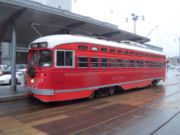 |
|
| Peter Witt Peter Witt streetcar Peter Witt was a Cleveland Railway commissioner, who designed a model of streetcar known by his name, and used in many North American cities, most notably in Toronto and Cleveland.-Features:... |
1928 | 11 | High | , at most F-line stops. |  |
||
| Various | 1912- | 7 | High | , at most F-line stops. | |||
| Cable Car Cable car (railway) A cable car or cable railway is a mass transit system using rail cars that are hauled by a continuously moving cable running at a constant speed. Individual cars stop and start by releasing and gripping this cable as required... |
Various | 1873- | 40 | High | 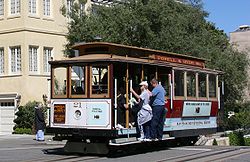 |
||
Muni also tested a 40-foot double-decker bus
Double-decker bus
A double-decker bus is a bus that has two storeys or 'decks'. Global usage of this type of bus is more common in outer touring than in its intra-urban transportion role. Double-decker buses are also commonly found in certain parts of Europe, Asia, and former British colonies and protectorates...
from Alexander Dennis Limited but the bus is now at Las Vegas' Deuce
The Deuce
The Deuce is the name of the double-decker bus line serving Las Vegas operated by RTC Transit. These buses went into service on October 27, 2005...
route.
Historical bus fleet
| Manufacturer | Model | Date of Retirement | Stored | Wheelchair accessible? | Image |
|---|---|---|---|---|---|
| New Flyer Industries New Flyer Industries New Flyer Industries Inc. is a bus manufacturer in North America, headquartered in Winnipeg, Manitoba, Canada. It also has factories in Crookston and St. Cloud, Minnesota, USA.-History:... |
D40 | 2007 | Muni Metro East |  |
|
| Orion Bus Industries Orion Bus Industries Orion International, previously Orion Bus Industries and Ontario Bus Industries in Canada and Bus Industries of America in the United States, is a bus manufacturer based in Mississauga, Ontario, Canada and established by the Government of Ontario in 1975... |
I Citycruiser | 2007-2008 | Muni Metro East |  |
|
| Flyer Industries | E800 | 2007 | Potrero Division |  |
|
| Flyer Industries | D902 | 2003 | Muni Metro East |  |
|
| MAN AG | SG-310 | 2002 | Muni Metro East | 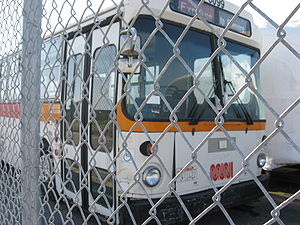 |
|
| GM | New Look | 1991 | Muni Metro East | ||
| Flxible Flxible The Flxible Co. was a motorcycle sidecar, funeral car, ambulance, intercity coach and transit bus manufacturing company based in the United States that was founded in 1913, and which closed in 1996.-History:In 1913, Hugo H. Young and Carl F... |
New Look Flxible New Look bus The Flxible New Look bus is a transit bus introduced in 1960 by The Flxible Company, and produced from 1960 until 1978, when the New Look was replaced by the "870" Advanced Design Bus. Over its 17-year production run 13,121 Flxible New Look buses were manufactured.-Design:The Flxible New Look bus... |
1991 | Muni Metro East | ||
| AM General AM General AM General is an American heavy vehicle manufacturer based in South Bend, Indiana. It is best known for the civilian Hummer and the military Humvee, that is assembled in Mishawaka, Indiana... |
1991 | Muni Metro East | |||
| Twin Coach Twin Coach Twin Coach was an American vehicle manufacturing company from 1927 to 1955, based in Kent, Ohio, and a maker of marine engines and airplane parts until the 1960s. It was formed by brothers Frank and William Fageol when they left the Fageol Motor Company in 1927. They established the company in... |
1977 | Potrero Division | |||
| Marmon-Herrington Marmon-Herrington The Marmon-Herrington Company, Inc. is an American-based manufacturer of axles and transfer cases for trucks and other vehicles. Earlier, the company built military vehicles and some tanks during World War II, and until the late 1950s or early 1960s was a manufacturer of trucks and trolley buses... |
1977 | Potrero Division | |||
| White White White is a color, the perception of which is evoked by light that stimulates all three types of color sensitive cone cells in the human eye in nearly equal amounts and with high brightness compared to the surroundings. A white visual stimulation will be void of hue and grayness.White light can be... |
798 | 1970 | Muni Metro East | ||
| Mack Mack Trucks Mack Trucks is an American truck-manufacturing company and a former manufacturer of buses and trolley buses. A wholly owned subsidiary of Renault Véhicules Industriels since 1990, Mack Trucks is currently a subsidiary of AB Volvo. The company's headquarters are located in Greensboro, North Carolina... |
C-49 | 1974 | Muni Metro East |
Divisions
| Division | Open Date | Features | Number of Vehicles | Location |
|---|---|---|---|---|
| Presidio Division | 1912 | Dyno, Repair, Storage, Car Wash | ~200 | Bush and Presidio |
| Potrero Division | 1914 | Paint shop, Dyno, Repair, Storage, Car Wash | ~170 | 17th St. & Bryant |
| Woods Yard Park | 1975 | Paint shop, carpentry, dyno, car wash, repair, storage, Historic fleet storage | ~500 | 22nd & Indiana |
| Flynn Division | 1980s | Parts, car wash, repair, storage | 124 | 15th St. & Harrision |
| Kirkland Division | 1950 | Car wash, dyno, storage, repair | ~50 | Powell & Beach |
| Geneva complex (Includes Curtis Green, Geneva Division, Geneva Upper yard) | 1901-1970s | Paint shop, repair, storage, car wash, paint team, parts | ~200 | San Jose & Geneva |
| Metro East Light Rail complex | 2008 | Unknown | 80-100 | Cesar Chavez & Illinois |
| Cable Car | 1890s | Repair, storage, Cable Car Museum | 50 | Washington & Mason |
| David Pharr Restoration Facility | 1982 | Storage, restoration, carpentry | 5 | Duboce and Buchanan |
| Marin | 1982 | Storage | Unknown | Marin & Indiana |
Diesel buses
Muni's active diesel fleet contains coaches ranging from thirty to sixty feet in length. The standard 40 ft vehicles include NeoplanNeoplan USA
Neoplan USA was a major transit bus manufacturing company based in Denver, Colorado, which was entirely separate from the German corporation, Neoplan, licensing its designs from the German company of the same name. The company was founded in 1981 and folded in 2006. It was originally a subsidiary...
(now defunct) AN440, NABI
Nabi
Nabi may refer to:* Prophets of Islam, humans who, in the Islamic faith, have been chosen as prophets by God**Nabi * Butterfly in the Korean language** Nabi , a 2001 South Korean film** The Korean language title of Mr...
(the American arm of Ikarus) 416, and Orion VII models. Additionally, there are a handful of Gillig Phantoms in reserve duty. At the small end of the scale, Muni has 30 30 ft Orion
Orion Bus Industries
Orion International, previously Orion Bus Industries and Ontario Bus Industries in Canada and Bus Industries of America in the United States, is a bus manufacturer based in Mississauga, Ontario, Canada and established by the Government of Ontario in 1975...
VIIs. At the large end of the scale, Muni's articulated diesel fleet is made up of Neoplans AN460s. The Orion VIIs (both 30 ft and 40 ft models) are unique in the Muni fleet in that they are powered by a hybrid diesel-electric system, with one being a Wi-Fi enabled bus.
The Orion VII do not operate on the 44 O'Shaugnessy and the 54-Felton due to vandals flipping the switches on the back of the hybrid buses.
In December 2007, Muni acquired a double decker diesel bus for testing purposes. Its proponents claim that the double decker makes more efficient use of Muni's limited service bays, that the lack of an articulation joint will result in a lower cost of ownership, and that the shorter length will also be a boom in congested areas. Its detractors claim that dwell time is increased because there are fewer exits than on an articulated bus, and that Muni's traditionally lax security will render the top level of the bus unsafe.
Historically, Muni has run standard length buses from a wide variety of manufactures. Articulated buses were sourced from MAN (retired in 2002) and New Flyer
New Flyer Industries
New Flyer Industries Inc. is a bus manufacturer in North America, headquartered in Winnipeg, Manitoba, Canada. It also has factories in Crookston and St. Cloud, Minnesota, USA.-History:...
, which were retired in 2007-2009.
All of Muni's current active diesel buses meet ADA standards.
Electric trolleybuses
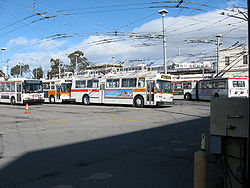
Trolleybus
A trolleybus is an electric bus that draws its electricity from overhead wires using spring-loaded trolley poles. Two wires and poles are required to complete the electrical circuit...
es (ETBs) were very popular in the United States throughout much of the 20th century. Today, San Francisco is one of five cities in the United States with an operational ETB fleet. Muni's ETB fleet is one of the largest in the nation, and services many parts of the city. Initially the ETBs were met with resistance, as residents preferred the uncluttered skylines that the streetcars provided. However, after the 1906 earthquake, ETBs were seen as a cheaper option than rebuilding the cable car infrastructure and eventually the resistance faded. Indeed, there are plans in the works to electrify existing diesel lines.
Muni's active ETB fleet consists of articulated coaches from New Flyer
New Flyer Industries
New Flyer Industries Inc. is a bus manufacturer in North America, headquartered in Winnipeg, Manitoba, Canada. It also has factories in Crookston and St. Cloud, Minnesota, USA.-History:...
and Electric Transit, Inc. (ETI)
Electric Transit, Inc.
Electric Transit, Inc. was a joint venture between the Škoda group in the Czech Republic and AAI Corporation in the United States which made trolleybuses for the Dayton and San Francisco trolleybus systems, constructing a total of 330 trolleybuses. ETI was formed in 1994, and ownership was divided...
(Skoda/AAI), as well as standard 40 ft coaches from ETI. Historically, Muni has run ETBs from Brill, the St. Louis Car Company
St. Louis Car Company
The St. Louis Car Company was a major United States manufacturer of railroad passenger cars, streetcars, trolleybuses and locomotives that existed from 1887–1973, based in St. Louis, Missouri.-History:...
, Twin Coach
Twin Coach
Twin Coach was an American vehicle manufacturing company from 1927 to 1955, based in Kent, Ohio, and a maker of marine engines and airplane parts until the 1960s. It was formed by brothers Frank and William Fageol when they left the Fageol Motor Company in 1927. They established the company in...
, Marmon-Herrington
Marmon-Herrington
The Marmon-Herrington Company, Inc. is an American-based manufacturer of axles and transfer cases for trucks and other vehicles. Earlier, the company built military vehicles and some tanks during World War II, and until the late 1950s or early 1960s was a manufacturer of trucks and trolley buses...
, and Flyer.
Cable cars
Around the turn of the century, there were numerous cable car lines providing service to many sections of the city. Some of those cable cars are built by Muni themselves. Currently only three lines and forty cars remain.Contemporary light rail vehicles
The Muni MetroMuni Metro
Muni Metro is a light rail system serving San Francisco, California, operated by the San Francisco Municipal Railway , a division of the San Francisco Municipal Transportation Agency...
has run two types of light rail
Light rail
Light rail or light rail transit is a form of urban rail public transportation that generally has a lower capacity and lower speed than heavy rail and metro systems, but higher capacity and higher speed than traditional street-running tram systems...
vehicles. Originally, Boeing-Vertol
US Standard Light Rail Vehicle
The US Standard Light Rail Vehicle was an attempt at a standardized light rail vehicle promoted by the United States Urban Mass Transportation Administration and built by Boeing Vertol in the 1970s...
cars were used. However, these proved extremely troublesome and were phased out of service beginning in 1997. The Boeing cars were replaced by Italian-built Breda LRV2 and LRV3 models. Initially the Breda vehicles were hailed as more reliable and easier to service than their predecessors. However, deferred maintenance and design defects have taken their toll on Muni riders.
Historic streetcars
Historic streetcars are run on the F Market & Wharves line. Introduced as a regular, year-round service in 1995, the F-line heritage streetcarHeritage streetcar
Heritage streetcars or heritage trams are a development of the heritage railways that are becoming popular across the world. As with modern streetcar systems, the vehicles are referred to as trams or tramcars in the United Kingdom, Australasia and certain other places , but as streetcars or...
service started out 12 years earlier as a temporary, replacement tourist attraction for the cable cars, during an almost two-year suspension (1982–84) of all cable-car service to permit major infrastructure maintenance to take place place. The F line fleet comprises mostly PCC cars
PCC streetcar
The PCC streetcar design was first built in the United States in the 1930s. The design proved successful in its native country, and after World War II was licensed for use elsewhere in the world...
painted in liveries from cities around the United States, as well as 1920s-vintage Peter Witt
Peter Witt streetcar
Peter Witt was a Cleveland Railway commissioner, who designed a model of streetcar known by his name, and used in many North American cities, most notably in Toronto and Cleveland.-Features:...
cars from Milan. Streetcars from many other cities round out the vintage fleet.
First batch (overhauled by Morrison-Knudsen)
This shows the active PCC
PCC streetcar
The PCC streetcar design was first built in the United States in the 1930s. The design proved successful in its native country, and after World War II was licensed for use elsewhere in the world...
s entering service 1995 or before. All of these cars were rehabilitated by Morrison-Knudsen before entering revenue service. Car 1054 (original 2121) was wrecked in an accident on 11/16/03 and is stored beyond repair.
| PCC # | City/System Represented | Type of PCC | Current Status | Notes | Image |
|---|---|---|---|---|---|
| 1007 | Philadelphia Suburban | Double-ended "Torpedo" PCC | Operational | This car was purchased in 1948 and ran in San Francisco until retirement in 1982. Stored in Pier 72 until 1994, then the car was restored for the F-line. This car was previously painted in Muni's 1995 Breda livery, but was repainted in 1997 into the Philadelphia Suburban livery. |  |
| 1010 | San Francisco (blue/gold) | Double-ended "Torpedo" PCC | Operational | This car was purchased in 1948 and ran in San Francisco until retirement in 1982. Stored in Pier 72 until 1994, then the car was restored for the F-line in 1996. | |
| 1015 | Illinois Terminal | Double-ended "Torpedo" PCC | Operational | This car was purchased in 1948 and ran in San Francisco until retirement in 1982. Stored in Pier 70 until 1994, then the car was restored for the F-line in 1995. | 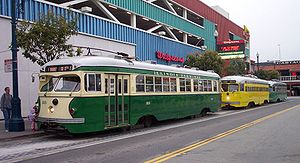 |
| 1050 | San Francisco Municipal Railway (Wings) | Single-ended PCC | Operational | Purchased in 1948 by Philidelphia Transportation Company as 2119 until retirement in 1989. This car was sold to San Francisco Municipal Railway in 1992 and has been in active service since 1995. | |
| 1051 | San Francisco (simplified) | Single-ended PCC | Operational | Purchased in 1948 by Philidelphia Transportation Company as 2123 until retirement in 1989. This car was sold to San Francisco Municipal Railway in 1992 and has been in active service since 1995. |  |
| 1052 | Los Angeles (NCL) Shirley Temple Livery | Single-ended PCC | Operational | Purchased in 1948 by Philidelphia Transportation Company as 2110 until retirement in 1989. This car was sold to San Francisco Municipal Railway in 1993 and has been in active service since 1995. | |
| 1053 | Brooklyn, NYC Board of Transportation/Transit Authority | Single-ended PCC | Operational | Purchased in 1947 by Philidelphia Transportation Company as 2721. This car was originally a double-ended car, along with car 1060, until their conductor booths were removed in 1955. This car ran in revenue service until retirement in 1992 and was sold to San Francisco Municipal Railway in 1993. This car has run in active service since 1995. | 1999: 2011: |
| 1055 | Philadelphia Transportation Company (PCC-2 Livery) | Single-ended PCC | Operational | Purchased in 1948 by Philidelphia Transportation Company as 2122 until retirement in 1988. This car was sold to San Francisco Municipal Railway in 1993 and has been in active service since 1995. |  |
| 1056 | Kansas City Public Service | Single-ended PCC | Operational | Purchased in 1948 by SEPTA as 2113 until retirement in 1988. This car was sold to the San Francisco Municipal Railway in 1993 and has been in active service since 1995. This car has had the least mileage on it out of all of Muni's SEPTA cars because it was out of service from 2001 to 2007 following a major accident. | |
| 1057 | Cincinnati Street Railway | Single-ended PCC | Operational | Acquired by muni from SEPTA, Philadelphia PA in 1992. Roof was recently replaced and the entire car was repainted. | |
| 1058 | Chicago Transit Authority Chicago Transit Authority Chicago Transit Authority, also known as CTA, is the operator of mass transit within the City of Chicago, Illinois and some of its surrounding suburbs.... (Green Hornet Livery) |
Single-ended PCC | Operational | Originally built for Philadelphia Transportation Company as car 2124. Recently returned to service following repairs after an accident. Repainted in late 1940s CTA "Green Hornet" livery. | 1999: 2011: |
| 1059 | Boston Elevated Railway Boston Elevated Railway The Boston Elevated Railway was a precursor first to the Metropolitan Transit Authority in Massachusetts, now the Massachusetts Bay Transportation Authority, operating rapid transit, streetcars and buses in the Boston, Massachusetts area. It was formerly known as the West End Street Railway.The... (now MBTA) (Orange livery) |
Single-ended PCC | Operational | Acquired by Muni from SEPTA in 1992. | |
| 1060 | Philadelphia Transportation Company (PCC-1938 Livery) | Single-ended PCC | Operational. | This car was originally a double-ended car, along with car 1054, until their conductor booths were removed in 1955. Was in Newark City Subway livery from 1995 to 2002 when it was involved in a derailment. Has since been repaired and repainted into 1938 Philidelphia Transportation Company livery to replace the permanently retired 1054. |  |
| 1061 | Pacific Electric | Single-ended PCC | Under repair | Acquired by Muni from SEPTA in 1992, temporarily out of service, awaiting parts for restoration. |  |
| 1062 | Louisville Railway Company | Single-ended PCC | Operational | Acquired by Muni from SEPTA in 1992 | |
| 1063 | Baltimore Transit Commission | Single-ended PCC | Operational | Acquired by Muni from SEPTA in 1992 | 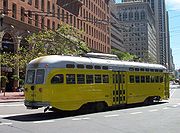 |
Second batch (overhauled by Brookville Equipment Company)
This shows the PCCs that were scheduled to re-enter service in 2008, but some are held out of service due to wiring problems. All of these cars were purchased by Twin Cities Rapid Transit in 1946. They were sold to Newark in 1953 and ran on the Newark City Subway until replacement by LRVs in 2001. The San Francisco Municipal Railway acquired these cars in 2004 and had the cars overhauled at Brookville Equipment Company. Some of the cars were put in service in early 2007, but were taken out of service for wiring problems. Currently some are being repaired. All of these cars are single-ended PCCs
| PCC # | City/System Represented | Current Status | Notes | Image |
|---|---|---|---|---|
| 1070 | Newark City Subway | Undergoing restoration, back in San Francisco for testing following rewiering. | Acquired by Muni from New Jersey Transit, Newark in 2004 |  |
| 1071 | Twin Cities Rapid Transit | Operational | Acquired by Muni from New Jersey Transit, Newark in 2004 | |
| 1072 | Mexico City | Undergoing restoration, back in San Francisco for testing following rewiering. | Acquired by Muni from New Jersey Transit, Newark in 2004 | |
| 1073 | El Paso-Juarez | Undergoing restoration at Brookfield Equipment company. | Acquired by Muni from New Jersey Transit, Newark in 2004 | |
| 1074 | Toronto, Ontario, Canada | Undergoing restoration, back in San Francisco for testing following rewiering. | Acquired by Muni from New Jersey Transit, Newark in 2004 |  |
| 1075 | Cleveland Transit System | Undergoing restoration | Acquired by Muni from New Jersey Transit, Newark in 2004 |  |
| 1076 | Washington, DC | Operational | Acquired by Muni from New Jersey Transit, Newark in 2004 | |
| 1077 | Birmingham, Alabama | Operational | Acquired by Muni from New Jersey Transit, Newark in 2004 |  |
| 1078 | San Diego | Undergoing restoration | Acquired by Muni from New Jersey Transit, Newark in 2004 |  |
| 1079 | Detroit, Michigan | Undergoing restoration | Acquired by Muni from New Jersey Transit, Newark in 2004 | |
| 1080 | Los Angeles (National City Lines National City Lines National City Lines, Inc. , was a controversial company founded in Minnesota, United States in 1920 as a modest local transport company operating two buses which was reorganized into a holding company in 1936 with equity funding from General Motors, Firestone Tire, Standard Oil of California and... ) |
Undergoing restoration | Acquired by Muni from New Jersey Transit, Newark in 2004 | |
10xx class
The following shows the cars acquired by Muni in the 1940s to 1952. One car in particular, car 1040, is the last PCC streetcar
PCC streetcar
The PCC streetcar design was first built in the United States in the 1930s. The design proved successful in its native country, and after World War II was licensed for use elsewhere in the world...
ever built in the United States.
| PCC # | City/System Represented | Status | Notes | Image |
|---|---|---|---|---|
| 1006 | San Francisco (wings) | Undergoing restoration at Brookville, PA | This car was purchased in 1948 and ran in San Francisco until retirement in 1987. |  |
| 1008 | San Francisco (wings) | Undergoing restoration at Brookville, PA | Purchased 1948 and ran in San Francisco until converted to wrecker service in 1982 to replace car #130. | |
| 1009 | Dallas Terminal & Railway | Undergoing restoration at Brookville, PA | This car was purchased in 1948 and ran in San Francisco until retirement in 1982. This car was stored in Pier 72 where it was damaged by arsonists. |  |
| 1011 | San Francisco (Market Street Railway zip stripe) | Undergoing restoration at Brookville, PA | This car was purchased in 1948 and ran in San Francisco until retirement in 1982. This car was stored in Pier 72 where it was damaged by arsonists. |  |
| 1023 | San Francisco | Stored | ||
| 1026 | San Francisco | Stored | ||
| 1027 | San Francisco | Stored | ||
| 1028 | San Francisco | Stored | ||
| 1031 | San Francisco | Stored | ||
| 1033 | San Francisco | Stored | Purchased 1952 as the seventh-to-last PCC streetcar ever built in the United States. Ran in San Francisco until retirement in 1982. After retirement, it was sold to Orange Empire Railway Museum Orange Empire Railway Museum The Orange Empire Railway Museum , 2201 South "A" Street, Perris, California, is a railroad museum founded in 1956 at the Pinacate Station as the "Orange Empire Trolley Museum." The museum also operates a heritage railroad on the museum grounds.-Background:The collection focuses on Southern... . The car was reacquired in 2003 and is currently stored in Marin Division. |
 |
| 1034 | San Francisco | Stored | Purchased 1952 as the sixth-to-last PCC streetcar ever built in the United States. Ran in San Francisco until retirement in 1982. After retirement, it was sold to Gunnar Henrioulle in Lake Tahoe Lake Tahoe Lake Tahoe is a large freshwater lake in the Sierra Nevada of the United States. At a surface elevation of , it is located along the border between California and Nevada, west of Carson City. Lake Tahoe is the largest alpine lake in North America. Its depth is , making it the USA's second-deepest... . The car was reacquired in 2001 and is currently stored in Marin Division. |
 |
| 1038 | San Francisco | Stored | Purchased 1952 as the third-to-last PCC streetcar ever built in the United States. Ran in San Francisco until retirement in 1982. After retirement, the car was stored in Pier 72 for a short while until moved to Marin Division. | |
| 1039 | San Francisco (Simplified) | Stored | Purchased 1952 as the second-to-last PCC streetcar ever built in the United States. Ran in San Francisco until retirement in 1982. After retirement, it was sold to Orange Empire Railway Museum Orange Empire Railway Museum The Orange Empire Railway Museum , 2201 South "A" Street, Perris, California, is a railroad museum founded in 1956 at the Pinacate Station as the "Orange Empire Trolley Museum." The museum also operates a heritage railroad on the museum grounds.-Background:The collection focuses on Southern... . The car was reacquired in 2003 and is currently stored in Marin Division. |
|
| 1040 | San Francisco (wings) | Undrgoing restoration | Purchased 1952 as the last PCC streetcar ever built in the United States. Ran in San Francisco until repainted to Landor livery in 1980. The car then ran for two more years and was repainted back to wings livery for the 1983 trolley festival. Stored out of service in 1987, then operated in tripper service in 1995 for a short time, then finally retired in 1997. 1040 left San Francisco on December 4, 2009 to undergo a full restoration at Brookville Equipment Company in Pennsylvania. It's expected to return to San Francisco in mid-October 2011. | |
| 1054 | Philadelphia Transit Commission (PCC-1938 Livery) | Permanently out of service | Purchased in 1948 by Philidelphia Transportation Company as 2121 and ran until retirement in 1988. Sold to San Francisco Municipal Railway in 1992 and returned to service in 1995 until collision from a MUNI Metro Muni Metro Muni Metro is a light rail system serving San Francisco, California, operated by the San Francisco Municipal Railway , a division of the San Francisco Municipal Transportation Agency... Breda LRV 1541 on 11/16/03. Stored beyond repair in Marin Division. |
 |
11xx class
The 1100s series of cars were purchased in 1957 by Muni from St. Louis Public Service. These cars were retired in 1982, with most being sold off to Tahoe Valley Lines and then went to St. Charles, Missouri in 2007 for the planned St. Charles City Streetcar
St. Charles City Streetcar
The St. Charles City Streetcar is a proposed new heritage streetcar line to be built connecting the New Town, Missouri residential development to the nearby city of St. Charles. This is a joint effort between Whittaker Builders, Inc, and the City of St. Charles and St. Charles Area Transit...
.
| PCC # | City/System Represented | Status | Image |
|---|---|---|---|
| 1103 | San Francisco | Stored | |
| 1106 | San Francisco | ||
| 1108 | San Francisco | ||
| 1115 | San Francisco | ||
| 1125 | San Francisco |  |
|
| 1128 | St. Louis Public Service | ||
| 1130 | San Francisco | ||
| 1139 | San Francisco |  |
|
| 1140 | San Francisco | ||
| 1158 | San Francisco |  |
|
| 1160 | San Francisco | ||
| 1168 | San Francisco | ||
Boeing LRVs in storage
The US Standard Light Rail Vehicle was an attempt at a standardized light rail
Light rail
Light rail or light rail transit is a form of urban rail public transportation that generally has a lower capacity and lower speed than heavy rail and metro systems, but higher capacity and higher speed than traditional street-running tram systems...
vehicle (LRV) promoted by the United States Urban Mass Transit Administration (UMTA) and built by Boeing Vertol
Boeing Helicopters
Boeing Rotorcraft Systems is a US aircraft manufacturer, now part of Boeing Defense, Space & Security...
in the 1970s. Part of a series of defense conversion projects in the waning days of the Vietnam War
Vietnam War
The Vietnam War was a Cold War-era military conflict that occurred in Vietnam, Laos, and Cambodia from 1 November 1955 to the fall of Saigon on 30 April 1975. This war followed the First Indochina War and was fought between North Vietnam, supported by its communist allies, and the government of...
, the LRV was seen as both a replacement for older PCC streetcar
PCC streetcar
The PCC streetcar design was first built in the United States in the 1930s. The design proved successful in its native country, and after World War II was licensed for use elsewhere in the world...
s in many cities and as a catalyst for new cities to construct light rail systems. The USSLRV was marketed as and is popularly known as the Boeing LRV (not to be confused with that company's prior lunar roving vehicles
Lunar rover
The Lunar Roving Vehicle or lunar rover was a battery-powered four-wheeled rover used on the Moon in the last three missions of the American Apollo program during 1971 and 1972...
for NASA
NASA
The National Aeronautics and Space Administration is the agency of the United States government that is responsible for the nation's civilian space program and for aeronautics and aerospace research...
) and is usually referred to as such. Both Muni and the MBTA (Boston) purchased the cars, but after a lawsuit with Boeing Vertol and MBTA, they had the ability to reject the last 40 cars. The cars sat in the storage yard, until Muni purchased 31 of them. Muni kept parts of the Boeing Vertol fleet until August 2007 and still has cars 1264 and 1320 on Muni property. One day, both 1264 and 1320 may be restored and run on the F Market & Wharves line. Boeing 1213 is preserved (since 2000) at the Oregon Electric Railway Museum
Oregon Electric Railway Museum
The Oregon Electric Railway Museum is the largest streetcar/trolley museum in the Pacific Northwest of the United States. It is owned and operated by the Oregon Electric Railway Historical Society and is located in Brooks, Oregon, on the grounds of Antique Powerland.The original museum opened in...
while 1258, is preserved at Western Railway Museum
Western Railway Museum
The Western Railway Museum, in Solano County, California is located on Highway 12 between Rio Vista and Suisun. The museum is built along the former mainline of theSacramento Northern Railway...
.
| Car # | City/System Represented | Status | Image |
|---|---|---|---|
| 1264 | San Francisco (Landor) | Unknown | 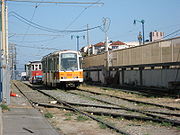 |
| 1320 | San Francisco (Landor-simplified livery) | ||
Milan "Peter Witt" trams
All of these were originally in service in MilanTrams in Milan
The Milan tramway network is an important part of the public transport network of the city and comune of Milan, in the region of Lombardy, northern Italy.In operation since 1876, the network is presently about long...
, Italy. This origin can still be seen in the cars, as all the original Italian
Italian language
Italian is a Romance language spoken mainly in Europe: Italy, Switzerland, San Marino, Vatican City, by minorities in Malta, Monaco, Croatia, Slovenia, France, Libya, Eritrea, and Somalia, and by immigrant communities in the Americas and Australia...
signs and notices are still in place. In the meantime, additional signs in English were added.
| Car # | Livery | Status | Image |
|---|---|---|---|
| 1807 | Milan, Italy (Orange) | Operational | 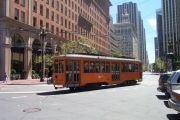 |
| 1811 | Milan, Italy (Yellow/White) | Operational |  |
| 1814 | Milan, Italy (Orange) | Under Repair. Seriously damaged in accident on 2/18/2010 by Muni Breda LRV. |  |
| 1815 | Milan, Italy (Orange) | Under Repair. Rear-ended by Muni LRV 1512 while entering service via J-line July 11, 2011. | |
| 1818 | Milan, Italy (Two-tone green) | Operational |  |
| 1834 | Milan, Italy (Orange) | Training Only | |
| 1856 | Milan, Italy (Orange) | Operational | |
| 1859 | Milan, Italy (Orange) | Operational | |
| 1888 | Milan, Italy (Two-tone green) | Undergoing overhaul | |
| 1893 | Milan, Italy (Orange) | Operational | |
| 1895 | Milan, Italy (Orange) | Operational | |
| Car # | City From (Tram Paint Colors) | Status | Notes | Image |
|---|---|---|---|---|
| 1 | San Francisco (Battleship Gray) | Operational, restoration complete. | This car was purchased in 1912 as one of the original streetcars publicly-owned by Muni. The car originally was retired in 1951 and was set aside for a museum. This car was restored in 1962 as part of Muni's 50th anniversary and ran occasionally on special excursions until the late 1980s. This car was restored again in 1995 for the opening of the F-line. In 2009 it was shipped to Brookville Equipment Company for a complete restoration at a cost of $1.8 million. It has since returned to San Francisco and testing has been complete, it's expected to return to limited service in 2011. | |
| 106 | Moscow/Orel, Russia (Red) | Awaiting restoration | ||
| 130 | San Francisco (Blue/Gold) | Under repair | ||
| 151 | Osaka, Japan | Stored | ||
| 162 | San Francisco (Wings) | Operational | This car was purchased in 1914 as part of a 100-car order from Jewett Car Company Jewett Car Company The Jewett Car Company was an early 20th century American industrial company that manufactured street cars.The company was founded in 1893 in Jewett, Ohio, where its first factory was located. In 1904, the company relocated from Jewett to a site along South Williams Street in Newark, Ohio, but... . This car ran in San Francisco until retirement in 1958 and was then sold with another car to Orange Empire Railway Museum Orange Empire Railway Museum The Orange Empire Railway Museum , 2201 South "A" Street, Perris, California, is a railroad museum founded in 1956 at the Pinacate Station as the "Orange Empire Trolley Museum." The museum also operates a heritage railroad on the museum grounds.-Background:The collection focuses on Southern... . It was reacquired in 2003 by the San Francisco Municipal Railway and restored by Market Street Railway in 2004. The car then underwent further restoration by Muni starting in 2005 and returned to service in August 2008, the 50-year anniversary of its earlier retirement. |
|
| 189 | Porto, Portugal | Undergoing restoration | ||
| 228 | Blackpool, England (Green/White) | Operational |  |
|
| 496 | Melbourne, Australia (Green/Beige) | Operational | 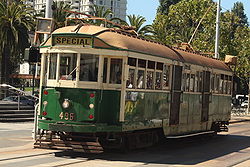 |
|
| 578-J | Kobe/Hiroshima, Japan | Undergoing restoration | ||
| 578-S | Market Street Railway | Charter service only | ||
| 586 | Melbourne, Australia (Green/Beige) | Out of service | ||
| 737 (7037) | Brussels, Belgium | Under repair | This car was operating in Brussels, Belgium, but was repainted in the blue-and-white colors in use by the Verkehrsbetriebe Zürich Verkehrsbetriebe Zürich Verkehrsbetriebe Zürich is a public transport operator in the Swiss city of Zurich, and is wholly owned by the city. Previously known as the Städtische Strassenbahn Zürich , the organisation was founded in 1896 and adopted its current name in 1950... . Zurich Zürich Zurich is the largest city in Switzerland and the capital of the canton of Zurich. It is located in central Switzerland at the northwestern tip of Lake Zurich... , Switzerland, is a sister city of San Francisco. The streetcars of Zurich use meter gauge, which means that they can't run on San Francisco's tracks. |
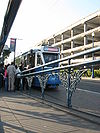 |
| 798 | Market Street Railway (Whiplash Green/White) | Undergoing restoration at Curtis E. Green complex. | 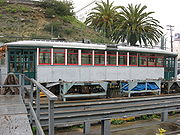 |
|
| 913 | New Orleans, Louisiana (Green) | Awaiting overhaul | ||
| 916 | Melbourne, Australia (Green) | Undergoing restoration | SW6 W class Melbourne tram The W class is a class of electric trams that operates in Melbourne, Victoria, Australia. The tram model series is a cultural icon to Melbourne... Class. Awaiting modifications necessary to operate on E and F line. |
|
| 952 | New Orleans, Louisiana (Green) | Under repair | ||
| 2133 | Philidelphia, Pennsylvania | Stored | ||
| 2147 | Philidelphia, Pennsylvania | Stored | Was SEPTA demonstration streetcar for F-line. Some erroneously believe it was renumbered as Muni 1064, but never carried passengers on Muni. Stored for parts, unlikely to be restored. | |
| 3557 | Hamburg, Germany (Brown/White) | Stored awaiting overhaul at Marin Division | Acquired for parts, 1990s. Complete but with different propulsion system than other SEPTA cars. Not likely to be restored. | |
| 4008 | Pittsburgh, Pennsylvania | Stored | Port Authority 4000 Series PCC Port Authority 4000 Series PCC The 4000 Series PCC was a streetcar used by the Port Authority of Allegheny County. The PCC streetcar was designed by the Presidents' Conference Committee, a group of transit operators in the United States and Canada. The 4000's were a series of cars completely rebuilt from cars built in 1949 by... , originally built for the Pittsburgh Railways Company, later the Port Authority of Allegheny County Port Authority of Allegheny County Port Authority of Allegheny County is the second-largest public transit agency in Pennsylvania and the 11th-largest in the United States. When considering that its service area is the 20th largest in the U.S... . When portions of Port Authority's streetcar system was being rebuilt and modernized in the 1980's, 45 of the Authority's PCC's were to be completely rebuilt as well. However due to budget problems, only a dozen were actually rebuilt, including this car and 4009. After the Overbrook Line's closure in 1993, these cars were relegated to a shuttle service between the Drake Loop and Castle Shannon until retirement in 1999. Purchased at auction in 2001, 4008 and 4009 are stored and require re-gauging as well as modifications to make them ADA-Compliant. |
|
| 4009 | Pittsburgh, Pennsylvania | Awaiting Overhaul | Purchased at auction in 2001, along with 4008. See 4008 above. | |
See also
- Peter Witt streetcarPeter Witt streetcarPeter Witt was a Cleveland Railway commissioner, who designed a model of streetcar known by his name, and used in many North American cities, most notably in Toronto and Cleveland.-Features:...
- US Standard Light Rail VehicleUS Standard Light Rail VehicleThe US Standard Light Rail Vehicle was an attempt at a standardized light rail vehicle promoted by the United States Urban Mass Transportation Administration and built by Boeing Vertol in the 1970s...
- Muni MetroMuni MetroMuni Metro is a light rail system serving San Francisco, California, operated by the San Francisco Municipal Railway , a division of the San Francisco Municipal Transportation Agency...
- Perley A. ThomasPerley A. ThomasPerley A. Thomas was a Canadian-born American industrialist and entrepreneur. He was trained as a millsmith , and moved to Cleveland, Ohio, where he was employed by a streetcar manufacturer....
- Jewett Car CompanyJewett Car CompanyThe Jewett Car Company was an early 20th century American industrial company that manufactured street cars.The company was founded in 1893 in Jewett, Ohio, where its first factory was located. In 1904, the company relocated from Jewett to a site along South Williams Street in Newark, Ohio, but...
- W.L. Holman Car Company

